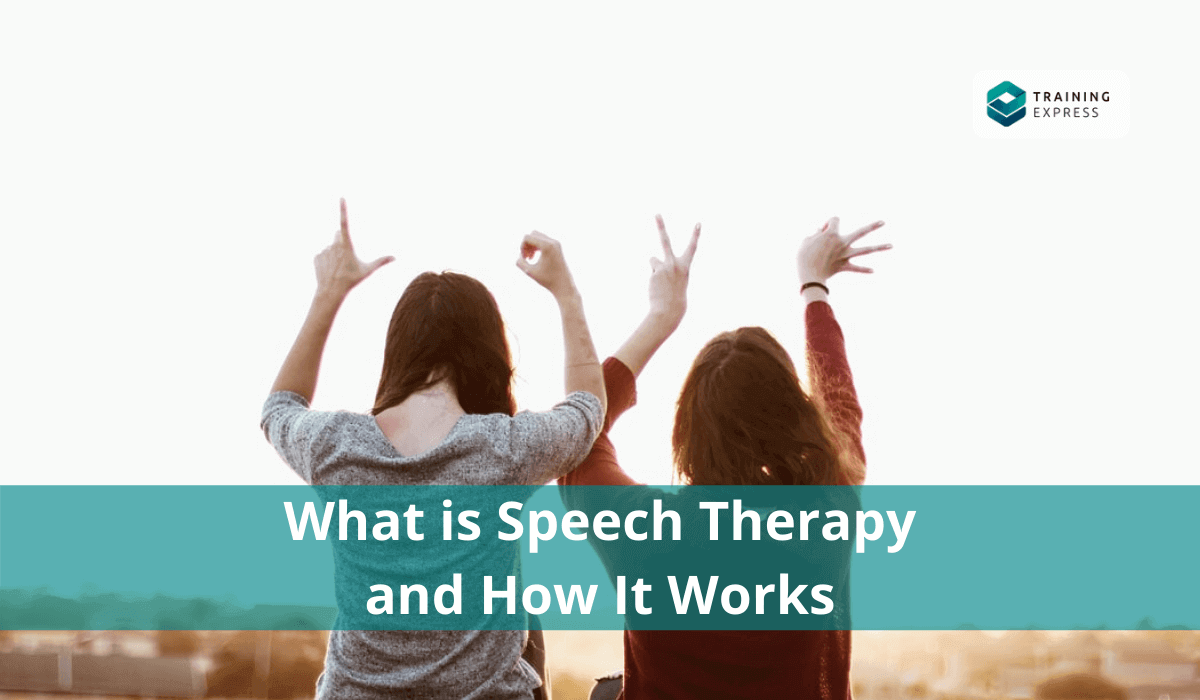
What is speech therapy? Is Speech and Language therapy a good career? How to become a speech therapist? Pay and benefits for Speech therapists.
Table of Contents
What is Speech and Language Therapy?
Difficulties related to speech, language, and eating/drinking need specific care. And the field for providing such care and treatment is Speech and Language Therapy. The experts in this field are speech and language therapists (SLT) or speech-language pathologists (SLP).
To get an idea of what is speech therapy, we need to understand that it’s a vast field. To put it another way, It covers an extensive range of areas. Mechanics of language, voice issues, articulation issues, etc., are just some examples.
When Do You Need Speech Therapy?
You might want Speech and Language Therapy when you or anyone you know is dealing with any of the following problems. In broader terms, speech and language therapy helps when there is-
- Some form of difficulty related to Speech,
- Problems related to Communication, and
- Any challenge related to consuming food and drinks.
These three major areas have many subtypes of disorders and conditions. And the way SLT works for each of these problem areas is different. Now that we have talked about what is speech therapy, let us look at the common types of SLT problems.

When There is Difficulty Related to Speech:
The common challenges that individuals usually face with Speech are usually conditions related to –
- Fluency
- Articulation or Speech production
- Voice
- Resonance
- Auditory disorders
- Dysarthria
Fluency Disorders
When a person faces challenges in pronouncing words with regular speed and rhythm, we call it a Fluency disorder. In other words, Fluency disorders obstruct people from speaking with a convenient flow. To illustrate, two common types of such Fluency disorders are cluttering and stuttering.
Speech Production
Another name for Speech production difficulties is ‘Articulation disorders.’
Sometimes a person faces challenges in pronouncing certain words/ sounds. As a result, s/he pronounces them distortedly. More specifically, we know this challenge as an articulation disorder.
Voice
There are socially acceptable levels of loudness, pitch, tone, quality, etc., while talking. And some disorders cause some people to struggle to speak within these ranges. Specifically- it is recognised as a voice condition.
Voice conditions can happen for physiological reasons. For example, the vocal system structure and nervous disorders are some common reasons for voice problems.
Resonance
The structure of the nasal and oral cavity causes Resonance disorders. Sometimes these cavities have some blockades, and regular airflow faces obstruction. As a result, this obstruction affects the sound quality. Because of that, sometimes there is too high or too low energy in the nasal and oral airflow. We diagnose such problems as resonance disorders.
Auditory Conditions
Speech-related conditions also root from auditory disorders. Sometimes children are born with hearing impairments. And occasionally, external causes result in loss of hearing.
Usually, therapy is quite beneficial to aurally impaired persons for developing the verbal tools for Communication. It also aids family members in communicating with the person facing hearing challenges.
Dysarthria
Sometimes, a person has difficulties in controlling his speech-producing muscles. We know such a condition by the name Dysarthria. Generally speaking, nervous system-related diseases, such as stroke, multiple sclerosis, etc., are commonly behind Dysarthria.
When There is Difficulty Related to Language or Communication:

Speech therapy also helps in dealing with different kinds of communicative obstacles. We can broadly categorise them into:
- Expressive disorders and
- Receptive disorders.
Expressive Disorders
Speech therapy helps overcome expressive disorders. When a person faces difficulties in expressing themselves, it’s an expressive disorder. Having trouble constructing meaningful sentences is a good example of this. Expressive disorders are usually cases of developmental challenges at birth. Besides this, external injuries or trauma also result in expressive disorders.
Speech and language therapy can be instrumental to solving reading-writing conditions. For example, Dyslexia. Professionals design therapies to make specific sounds first. Then they help the dyslexic person associate the sounds with alphabets. SLTs break down words part by part for doing these exercises.
Speech and Language therapy can also benefit individuals struggling with social communication skills. Generally, problem-solving skills, memory exercises, conversational activities, etc., are the standard exercises for this.

Receptive Disorders
Receptive disorders are another area of communicative conditions. These disorders affect a person’s ability to understand others and receive instructions.
Head injuries, aural impairments, autism, etc., account for receptive disorders.
Aphasia is another example of a communicative condition. In the case of this acquired condition, Stroke or other conditions are most commonly responsible. Aphasia interferes with a person’s ability to speak, understand, read, and write.
When There is Difficulty Related to Food and Drink Consumption:
Here is the interesting part of the answer to ‘What is Speech therapy.’ The name itself says ‘Speech and Language therapy.’ But alongside, it also helps with chewing, drinking, and swallowing problems.
Eating-drinking difficulties and speech and communication challenges are often closely related. Hence this correlation. Generally speaking, children and adults- both groups, can suffer from these problems.
The common forms of problems in eating-drinking related issues look like these-
- Patient’s inability to move the mouth, hence food and drink stays in mouth instead of going down.
- The patient chokes/ coughs heavily while eating/drinking.
- Rapid fatiguing while eating/ drinking
- Food and liquids rolling down patient’s mouth
- Food getting stuck in the throat
- Frequent throat clearing while consuming food and drink
There are obvious recurring problems caused by eating, drinking, and swallowing difficulties. But on top of that, these challenges come with some other severe risks. Hence, resorting early to speech and language therapy can prevent much damage in the long run.
How Speech and Language Therapy help with eating, swallowing, and drinking challenges –
There can be many ways in which SLT can address issues on eating, swallowing, and drinking. The first step, like always, is diagnosis. For this, the speech and language therapist usually observes certain things. S/he then strategises accordingly. For example, s/he might observe how the patient sits while eating. Or the surroundings and environment, consistency and texture of food, etc.
Sometimes a way for resolving these issues can be as simple as just working on the food consistency. SLT professionals usually dilute or thicken the food with appropriate agents. The resulting change in texture and consistency can create significant differences.
Designing and implementing exercises are often highly effective strategies too. The SLT professional works on devising and facilitating special exercises. These exercises involve muscle movements in the oral area. In addition, working the lips and the tongue the proper way can show excellent results. It often helps strengthen the muscles and making them more flexible.
There is another way in which SLT professionals help people with these challenges. It is by training their family members. When close people understand the right ways, things change for the better. To explain, they help create the right meal plans, lifestyle habits, and proper surroundings. In the long run, that can show fast and holistic results.
How does Speech Therapy Work?
Speech therapy varies according to the needs of the recipient. To explain, it depends on their age, types of challenges, etc.
Singular interactions, classes, focus groups, etc., are some standard arrangements for Speech therapy. The speech therapist generally suggests the best structures according to each case. To know how speech therapy works for different age groups, have a look here.
What is Early Intervention Speech Therapy?

In general, speech therapy at an earlier age results in much better output. Children with language troubles can gradually overcome their challenges with Speech therapy. Early intervention usually shows clear improvements in their social lives.
Speech therapy can also address difficulties in other forms of communication. For example, Dyslexia.
Speech therapists guide kids through different forms of exercise. These help them distinguish the unique sounds in words. Such practices can lead to improving the reading habits of children.
Popular activities designed for working with children are-
- Engaging children with the use of colourful books and visuals
- Modelling correct pronunciations repeatedly to help them follow
- Simple oral exercises
- Conducting family training for better-educating family members on how to communicate, etc.
What is Speech Therapy for Adults?
Pathological challenges always start with diagnosis and assessment. And Speech therapy for adults is no different from that. First of all, the speech therapist detects the specific problem areas. Then s/he designs the activities and interventions accordingly.
Usually, Speech and Language Therapy for adults is more rigorous than early interventions. That’s because it requires a lot more rewiring in general.
For helping with cognitive-communication, therapies choose cognition-boosting activities. For example, problem-solving exercises, memory activities, etc.
Sometimes strokes induce cognitive-communication challenges. So exercises focus on memory rehabilitation, recovery of articulation, retrieving vocabularies, etc.
Sometimes adults take Speech and Language Therapy to enhance confidence and presentation skills. Generally, voice coaching is the popular answer to such needs. The speech therapist detects the nature of the accent first. Then they target sounds and tones to correct and facilitates exercises accordingly.
For speech-related issues, therapists start by targeting the problem areas of phonetics. Then they conduct repeated practices of that sound first. After overcoming the sound-related challenge to some extent, the therapist targets words. Similarly, after working on words, the therapist helps them construct successful sentences.
Enrol Now: Speech and Language Therapy
Does Speech Therapy Actually Work?

The answer to this question, in all honesty, is yes. But that’s not a straightforward yes. To put it differently, the success rate heavily relies on the type of disorder and the intervention time. But, correct diagnosis and timing change everything. The probability of success dramatically goes up when that happens.
Receiving therapies earlier helps a patient to achieve fast and effective results. But keeping an open perspective here is essential. Speech therapies aren’t silver bullets that make an obstacle disappear. But with regular and suitable therapies, the disorder comes more under control.
The engagement between the subject and the therapist is a crucial factor too. For more involved persons, speech therapy shows more effective results. And better involvement depends on sharing a quality relationship with the speech therapist.
How Long does It Take for Speech Therapy to Work?
The answer to this question too is- ‘it depends.’ While learning about what is speech therapy, we learnt about the diverse areas that speech therapy covers. So the time it takes for speech therapy to come into effect differs.
Speech and language therapy addresses a wide variety of problems. The problems could root in many types of causes. For example, brain development, injuries, acquired diseases or conditions, etc. Psychological phenomena and physiological mechanisms are also common reasons. So there is no one specific way or time frame in which SLT works.
But, we can shortlist the factors on which the time needed for success depends into the following-
- Age of the person who’s taking therapy
- Type of condition or disorder
- How early SLT has been introduced
- Early childhood experiences
- Genetic or biological factors
- Medical history
- Consistency with which therapy has been continued.
To summarise, timeliness, earliness, and consistency matter. These are the keys to achieving good results from Speech and Language Therapy.
A few things you should know about Speech and Language Therapists-
So that was quite some discussion on what is speech therapy. You must be wondering by now about the people who are involved with this profession. Let’s talk a little about SLTs now.
Who are SLTs or SLPs
The obvious question to ask after learning what is speech therapy is, who are the professionals in this field?
We know the professionals in this field as Speech and Language Therapists (SLT). Speech and language professionals (SLP) is another common term. SLTs diagnose and treat conditions related to Speech and language. Issues with swallowing, drinking, eating, etc., also fall within their scope of work.
There are some requirements to fulfil to start as a Speech and Language professional in the UK. Being registered in the Health and Care Professionals Council (HCPC) is mandatory.
The registration process also requires an accredited degree. These degrees usually take 3-4 years of full-time commitment. You could pursue a master’s if you have a bachelor’s in another discipline. (Though related Bachelors is preferable.) To learn more about becoming an SLP, check out the official book of standards by HCPC.
Is Speech Therapy a Good Career?
Speech and Language Therapy is a profession with obvious intrinsic satisfactions. It genuinely empowers people to express themselves better. This aspect can be very fulfilling and rewarding.
Speech and Language therapists can practice at their flexibility of time and place. They are usually very much in demand all through, which ensures the availability of jobs.
The average annual salary for SLTs is much higher than the average salary in the UK. SLTs earn £22 per hour and £46,410 per year on average. Work demand, intrinsic values, and attractive salary range are valuable factors in any field. That makes Speech therapy an up-and-coming field to step into.
Want to learn more about what is speech therapy? Or how to get started as a Speech and Language therapist? You can simply go through this curriculum to get a general overview.
Parting Note
Speech therapy is not an everyday subject that we usually think or talk about. But Speech and Language Therapy truly has the power to transform lives. You’ll feel that on taking a closer look. Empowering someone to talk, communicate, or eat and drink can feel incredibly meaningful.
Learning more about SLT can open new dimensions for your career choice. Your decision to pursue this today can even transform someone’s life someday! There is no way to know right away; only the future can reveal that answer.
Read more on our blog
- How Future Healthcare Technology Is Elevating At-Home Care
- What is a Level 4 Diploma in Health and Social Care? A Complete Guide
- A Comprehensive Guide to Dementia Symptoms and Stages
- How to Clean an Oven? Easy, Effective, and Natural Ways
- What Color Tubes Are Used For Which Tests in Phlebotomy?
- Can You Reheat Chicken? Safe Methods, Tips, & Best Practices
- What Not To Say To Occupational Health UK
- How Many People Does A Sheet Cake Feed?
- Why Is Health and Social Care Important? A Complete Guide
- How Long Does an NVQ Take to Complete?
- Available Courses
- Animal care10
- Design28
- Training9
- Accounting & Finance Primary50
- Teaching & Academics Primary37
- Teaching23
- Quality Licence Scheme Endorsed181
- Law10
- IT & Software229
- Job Ready Programme52
- Charity & Non-Profit Courses28
- HR & Leadership4
- Administration & Office Skills4
- Mandatory Training36
- Regulated Courses4
- AI & Data Literacy24
- Health and Social Care290
- Personal Development1630
- Food Hygiene119
- Safeguarding80
- Employability288
- First Aid73
- Business Skills295
- Management425
- Child Psychology40
- Health and Safety533
- Hospitality28
- Electronics31
- Construction63
- Career Bundles201
- Marketing39
- Healthcare172

 Food Hygiene
Food Hygiene Health & Safety
Health & Safety Safeguarding
Safeguarding First Aid
First Aid Business Skills
Business Skills Personal Development
Personal Development